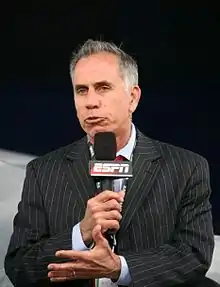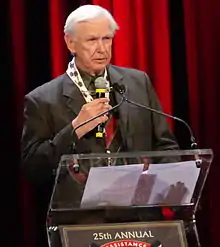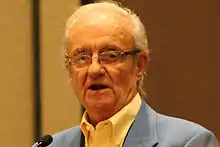Veterans Committee
The Veterans Committee is the popular name of various committees of the National Baseball Hall of Fame and Museum that elect participants other than recently retired players.
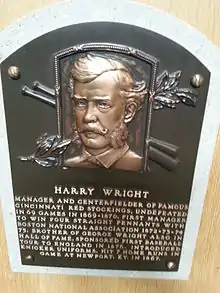
Originally, it referenced the National Baseball Hall of Fame Committee to Consider Managers, Umpires, Executives and Long-Retired Players;[1] a former voting committee of the Baseball Hall of Fame that provided an opportunity for Hall of Fame enshrinement to all individuals who are eligible for induction but ineligible for consideration by the Baseball Writers' Association of America (BBWAA). The term "Veterans Committee" is taken from the body's former official name: National Baseball Hall of Fame Committee on Baseball Veterans, which first met in 1953.
In July 2010, the Veterans Committee structure was changed by the Hall of Fame's board of directors and the name is no longer officially used, although the term remains in active use by various sports media.[2][3][4][5] In place of a single committee, the Hall established three 16-member voting committees by era:
- Expansion Era Committee (1973–present)[6]
- Golden Era Committee (1947–1972)[7]
- Pre-Integration Era Committee (1876–1946)[8]
Those three committees met on a rotating cycle once every three years to elect candidates from each era to the Hall of Fame that were identified (nominated) by a BBWAA-appointed screening group named the Historical Overview Committee, consisting of 10 to 12 representative BBWAA members. In 2010, 2011, and 2012, the three separate era committees had been responsible for considering a total of 32 candidates from three eras in the following categories: managers, umpires, executives (includes team owners, general managers, and major league officials), and long-retired players.
In July 2016, the Hall of Fame announced a further restructuring of the committees, revising the timeframes to be considered and placing a much greater emphasis on modern eras. The structure adopted, which remains in place, now consists of four committees:[9]
- Today's Game (1988–present)
- Modern Baseball (1970–1987)
- Golden Days (1950–1969)
- Early Baseball (1871–1949)
Those major league players, managers, umpires and executives who excelled before 1950, as well Negro league baseball stars, will still have an opportunity to have their careers reviewed, but with less frequency.[9]
History
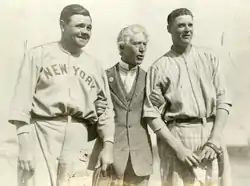
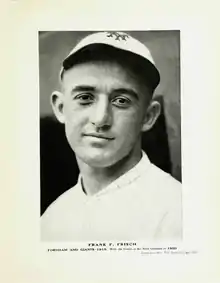

The Veterans Committee can be traced back to 1939 when Commissioner of Baseball Kenesaw Mountain Landis formed the Old-Timers Committee to consider players from the 19th century for induction to the Hall of Fame. In 1939, the committee selected five players. In 1944, shortly after Landis' death, the committee voted him into the Hall via a special election. Landis was the 28th person inducted to the Hall—over the next several years, the committee added 23 more: 10 in 1945, 11 in 1946, and 2 in 1949.
In 1953, the Veterans Committee met for the first time under the name Committee on Baseball Veterans. In its first voting, the 11-member committee elected six players to the Hall. Starting in 1955, they would meet to elect up to two players in odd-numbered years. In 1959, Lee Allen succeeded Ernest Lanigan as Hall of Fame historian. According to Bill James, Paul Kerr (president of the Hall of Fame from 1961 to 1978) would generally convince the committee to select players that Allen suggested to him, until Allen's death in 1969. In 1961, the Veterans Committee expanded from 11 to 12 members. In 1962, the Veterans Committee went back to annual elections to the Hall of Fame, with the continued mandate to elect up to two players a year. In 1971, the Veterans Committee made seven selections; partly in response to such a large class, the Veterans Committee was then limited to selecting two players and one non-player every year.
Frankie Frisch, a 1947 inductee to the Hall, was a major voice on the committee in the 1970s. Backed by former teammate and fellow Hall of Famer Bill Terry and sportswriters J. Roy Stockton and Fred Lieb, who had covered Frisch's teams, he managed to get five of his teammates elected to the Hall by the committee between 1970 and 1973: Jesse Haines, Dave Bancroft, Chick Hafey, Ross Youngs, and George Kelly.[10] Additionally, in the three years after his death, two more teammates (Jim Bottomley and Freddie Lindstrom) were elected.[10] After Frisch died and Terry left the committee, elections were normalized.
After the 1977 election, the Veterans Committee was limited to two selections overall per year. In 1978, membership increased to 15 members; five Hall of Famers, five owners and executives, and five sportswriters. The members would meet in Florida during spring training to elect a player or two every year. The Veterans Committee mandate of up to two players was increased briefly from 1995 to 2001. In these years, the committee could elect one extra player from the Negro leagues and one from the 19th century in addition to the two regular players.
Starting in 1995, the Veterans Committee met in closed sessions to elect as many as two executives, managers, umpires, and older major league players—the categories considered in all its meetings since 1953. By a new arrangement it separately considered candidates from the Negro leagues and from the 19th century with authority to select one from each of those, via two special ballots. The older players eligible were those with ten major league seasons beginning 1946 or earlier; those who received at least 100 votes from the BBWAA in some election up to 1992; and those who received at least 60% support in some election beginning 1993. Players on Major League Baseball's ineligible list cannot be elected. The committee can elect up to four people each year.
During much of its existence, the Veterans Committee consisted of 15 members selected by the Hall of Fame for defined terms. A six-man subcommittee of this group met as a screening committee to determine who would be on the ballot. The committee met annually to consider candidates in four separate categories: players, managers, umpires, and executives. The Veterans Committee met privately, and its ballots and voting results were generally not revealed prior to 2003. From the mid-1970s until 2001, the top candidate in each category was elected to the Hall of Fame if he earned at least 75% of the committee's votes.
The Board of Directors reformed the system radically with new rules enacted in August 2001. Formerly, 15 members were appointed to limited terms; the new Veterans Committee would comprise all living members of the Hall, plus recipients of the Spink and Frick awards to writers and broadcasters. In particular, the new members were 61 living Hall of Famers, 13 living recipients of the J. G. Taylor Spink Award, 13 living recipients of the Ford C. Frick Award, and three members of the previous committee with terms that had not yet expired. Elections for players retired more than 20 years would be held every other year and elections for (managers, umpires and executives) would be held every fourth year. The first cycle for both categories would be in 2002 and 2003 for induction in 2003.
Revisions to the voting process
2001 revisions
In 2001, the Hall of Fame radically changed the composition and election procedures for the Veterans Committee, which was revised to consist of:
- All living members of the Hall of Fame;
- All living recipients of the Ford C. Frick Award for baseball broadcasters;
- And all living recipients of the J. G. Taylor Spink Award for baseball writers.
All members of the former Veterans Committee remained active until the expiration of their terms. Only two were on the committee for the 2003 election, the first under the new election procedures. Only one of the former Veterans Committee members (John McHale) remained on the committee for the 2005 and 2007 elections, and his term expired immediately after the 2007 election.
The election procedures instituted in 2003 are listed below. The procedures were changed again in 2007. Rules, and portions thereof, that changed in 2007 are indicated in italics.
- Elections for players would now be held every two years, starting in 2003.
- Managers, umpires, and executives would be elected from a single composite ballot every four years, starting in 2003.
- The Historical Overview Committee, a ten-member panel appointed by the secretary-treasurer of the Baseball Writers' Association of America, created an initial list of figures from whom both ballots would be created. At this point, the players' ballot consisted of 200 players.
- Ballots were screened by two groups – a sixty-member panel drawn from the membership of the BBWAA, and a panel of six living Hall of Famers selected by the Hall of Fame Board. The Hall of Famer panel selected five players for the players' ballot, and the BBWAA panel selected twenty-five players for the players' ballot, as well as all candidates for the composite ballot.
- The selections of the Hall of Famer and BBWAA panels were then merged, creating a single players' ballot. Players chosen on both ballots appeared only once on this ballot, which now contained a minimum of twenty-five and a maximum of thirty players.
- The players' ballot and composite ballot (fifteen candidates) are made public before voting.
- Balloting is held by mail, with a stated deadline.
- The Veterans Committee vote is made public after voting.
- All candidates who receive 75% or more of the vote are elected; election is no longer restricted to only the top vote-getter.
- Every player with ten or more years of major-league experience who has not been active in the previous twenty years, and is not on Major League Baseball's ineligible list, is eligible for Veterans Committee consideration. In the past, players who did not receive a certain percentage of the votes on a BBWAA ballot were permanently ineligible for Hall of Fame consideration.
Using these procedures, no one was elected to the Hall of Fame by the Veterans Committee in 2003, 2005, or 2007.
2007 revisions
Following the 2007 elections, the makeup of the committee was again changed, and several procedures were also modified:[11]
- Changes affecting all elections
- The Historical Overview Committee will continue to formulate the players and managers/umpires ballots, but it will now present a players' ballot of only twenty players and a managers/umpires ballot of only ten figures. The executives ballot, consisting of ten individuals, will be formulated by the voting body for that ballot.
- Changes affecting player elections
- The players ballot is now restricted to players whose careers began in 1943 or later.
- Voting for the players ballot is now restricted to Hall of Fame members. Winners of the Frick and Spink Awards are considered "honorees" and are thus ineligible to vote on the main players ballot.
- The list of those eligible for the players ballot will be separately reviewed by a six-member panel of Hall of Famers, which will select five players for the ballot.
- Next, all living Hall of Famers are invited to a meeting at the Hall of Fame during induction weekend. The Hall of Famers who are present at this meeting will narrow the list to a final ballot of 10 players.
- The final players ballot is sent to all living Hall of Famers, who can vote for as many as four individuals.
- Pre-World War II players
- Players whose careers began before 1943 are now considered every five years by a committee of twelve Hall of Famers, writers, and baseball historians, to be chosen by the Hall of Fame Board. The first election of pre-World War II players was conducted in 2009.
- Changes affecting non-player elections
- The composite ballot will be split into two separate ballots, one for managers and umpires and the other for executives.
- Voting on the managers/umpires and executives ballots will now be conducted for induction in even-numbered years, starting with the class of 2008.
- The voting body for the managers/umpires ballot will be a sixteen-member body of Hall of Famers, executives, and media veterans appointed by the Hall of Fame Board.
- The voting body for the executives ballot will be a separate twelve-member body of Hall of Famers, executives, and media veterans appointed by the Hall of Fame Board.
- Each ballot is presented to the applicable voting board. As is the case for the players' ballot, each voter can choose as many as four individuals.
The threshold for induction remained at 75% of all who voted on the appropriate ballot. In the first election held under the new rules, two managers and three executives were elected in December 2007 as part of the 2008 election process.
2010 revisions
The Hall announced a new Veterans Committee voting process on June 26, 2010, effective with the 2011 election process that began late in 2010. The two biggest changes are:[12]
- Managers, umpires, executives, and players will now be considered on a single ballot.
- Living Hall of Fame members will no longer constitute a single electoral body. Instead, separate 16-member subcommittees will be created to vote on individuals from different eras of baseball.
Candidates will be classified by the time-periods that cover their greatest contributions:
- Pre-Integration Era (1871–1946)
- Golden Era (1947–1972)
- Expansion Era (1973 and later)
Candidates from each era will be considered every third year, starting with the Expansion Era in the 2011 election (December 2010, 2013), followed by the Golden Era (December 2011, 2014) and then by the Pre-Integration Era (December 2012, 2015).
The existing Historical Overview Committee will formulate each ballot for release in the October or November before the next planned induction ceremony. The Expansion Era ballot will include 12 candidates, while the other two ballots will include ten each. The Hall's Board of Directors will select 16-member committees for each era, made up of Hall of Famers, executives, baseball historians, and media members. Each committee will convene at the Winter Meetings in December to consider and vote on candidates from its assigned era. As before, the threshold of induction will remain at 75% of those voting.[12]
2016 revisions
On July 23, 2016, the Hall of Fame announced changes to the Era Committee system. Highlighting these changes is a restructuring of the time-frames to be considered, with a much greater emphasis on modern eras. Additionally, those major league players, managers, umpires and executives who excelled before 1950, as well Negro leagues stars, will still have an opportunity to have their careers reviewed, but with less frequency.[9]
Separate 16-member subcommittees will continue to vote on individuals from different eras of baseball, with candidates still being classified by the time-periods that cover their greatest contributions:
- Early Baseball (1871–1949)
- Golden Days (1950–1969)
- Modern Baseball (1970–1987)
- Today's Game (1988–present)
All committees' ballots will include ten candidates. Whilst there was previously a one-year waiting period after elimination from annual BBWAA consideration, there will now be no waiting period (for example, if a player was eliminated from BBWAA consideration, and some Hall of Fame members believe such player should be considered by the respective committee, they can be nominated on the next ballot of the era in question). The Today's Game and Modern Baseball committees will convene twice every 5 years, the Golden Days committee once every 5 years, and the Early Baseball committee once every 10 years.[9]
While meetings take place in December, voting is included with the induction class for the following calendar year (e.g. December 2016 committee balloting was part of 2017 Hall of Fame elections and induction).
| Meeting year | Induction year | Era Committee(s) meeting |
|---|---|---|
| 2016 | 2017 | Today's Game |
| 2017 | 2018 | Modern Baseball |
| 2018 | 2019 | Today's Game |
| 2019 | 2021 | Modern Baseball |
 The induction ceremony originally scheduled for July 26, 2020, was cancelled due to the COVID-19 pandemic; persons originally scheduled for induction in 2020 will be inducted in 2021.
The induction ceremony originally scheduled for July 26, 2020, was cancelled due to the COVID-19 pandemic; persons originally scheduled for induction in 2020 will be inducted in 2021.
Note that committee meetings originally scheduled for December 2020 (Golden Days and Early Baseball) were postponed for a year, due to the COVID-19 pandemic.[13] The below schedule reflects a one-year delay to all previously scheduled meetings; this is subject to change.
| Meeting year | Induction year | Era Committee(s) meeting |
|---|---|---|
| 2021 | 2022 | Golden Days, Early Baseball |
| 2022 | 2023 | Today's Game |
| 2023 | 2024 | Modern Baseball |
| 2024 | 2025 | Today's Game |
| 2025 | 2026 | Modern Baseball |
| 2026 | 2027 | Golden Days |
| 2027 | 2028 | Today's Game |
| 2028 | 2029 | Modern Baseball |
| 2029 | 2030 | Today's Game |
| 2030 | 2031 | Modern Baseball |
| 2031 | 2032 | Golden Days, Early Baseball |
The criteria for committee eligibility differ for players, managers, and executives.[14]
- Players: Must be retired for at least 15 years. This means that no player will be eligible for committee consideration until a minimum of 10 years after he first becomes eligible to appear on the BBWAA ballot, regardless of whether or not he appears on a ballot.
- The Hall has not yet established a policy on the timing of eligibility for committee consideration for players who die while active or during the standard 5-year waiting period for BBWAA eligibility. In these instances, the standard waiting period for BBWAA eligibility of 5 years from retirement is shortened to 6 months from death.
- Managers and umpires: Must have at least 10 years of service in that role, and either be (1) retired for at least 5 years or (2) at least age 65 and retired for 6 months.
- Executives: Must be retired for at least 5 years, or be at least age 70. Executives who meet the age cutoff will be considered regardless of their positions in an organization or their currently active statuses. Previously, active executives 65 years or older were eligible for consideration.[9]
Potential future candidates
Today's Game (1988–present)
Players: Albert Belle (on 2017 & 2019 ballots), Will Clark (on 2017 & 2019 ballots), Orel Hershiser (on 2017 & 2019 ballots), Joe Carter (on 2019 ballot), Mark McGwire (on 2017 ballot), Rick Aguilera, Kevin Appier, Kevin Brown, David Cone, Chuck Finley, John Franco, Dwight Gooden, Pat Hentgen, Jimmy Key, Mark Langston, Al Leiter, Dennis Martinez, Randy Myers, Brad Radke, José Rijo, Bret Saberhagen, Dave Stieb, Fernando Valenzuela, David Wells, John Wetteland, Darren Daulton, Javy Lopez, Cecil Fielder, Andrés Galarraga, Mark Grace, Fred McGriff, John Olerud, Rafael Palmeiro, Mo Vaughn, Chuck Knoblauch, Tony Phillips, Edgardo Alfonzo, Robin Ventura, Matt Williams, Dante Bichette, Ellis Burks, Brett Butler, Jose Canseco, Juan González, Brian Jordan, Ray Lankford, Kenny Lofton, Willie McGee, Tim Salmon, Devon White & Bernie Williams;[15] Managers: Davey Johnson (on 2008, 2017 & 2019 ballots), Charlie Manuel (on 2019 ballot), Lou Piniella (2017 w/ 7 votes & 2019 ballots w/ 11 ballots), Felipe Alou, Bruce Bochy, Roger Craig, Art Howe, Jim Leyland, Mike Hargrove, Johnny Oates, Buck Showalter, Bobby Valentine;[16] General Managers: John Hart, Dan O'Dowd;[17] Owners: George Steinbrenner (on 2011, 2014, 2017 & 2019 ballots), George W. Bush; Other Executives: Bill White (on 2007 w/ 24 votes & 2010 ballots); Umpires: Joe Brinkman, Derryl Cousins, Jerry Crawford, Bob Davidson, Tim McClelland, Ed Montague, Rich Garcia, Mike Reilly, & Tim Welke[18]
Players Moises Alou, Luis Gonzalez, Carlos Delgado, Troy Percival, Jim Edmonds, Nomar Garciaparra, Jason Kendall, Jorge Posada, Magglio Ordóñez, Édgar Rentería, Johan Santana, Johnny Damon, Miguel Tejada, Lance Berkman, Michael Young, Roy Oswalt, Adam Dunn, Paul Konerko, Cliff Lee, Jason Giambi, Alfonso Soriano & Eric Chavez are ineligible for the 2022 Today's Game ballot as they have not been retired for 15 years. Manager Mike Scioscia is ineligible until after the 2022 Today's Game ballot, as he will not have been retired for 5 years nor turned 65 until after that election. Manager Dusty Baker is ineligible until he retires from managing the Houston Astros for at least 6 months. Executives Dave Dombrowski and Stan Kasten are ineligible until after the 2022 Today's Game ballot, as they will not have been retired for 5 years nor turned 70 until after that election.
Modern Baseball (1970–1987)
Players: Steve Garvey (on 2011, 2014, 2018 & 2020 w/ 6 votes ballots), Tommy John (on 2011, 2014, 2018 & 2020 ballots), Dave Parker (on 2014, 2018 & 2020 w/ 7 votes ballots), Don Mattingly (on 2018 & 2020 ballots), Dale Murphy (on 2018 & 2020 ballots), Thurman Munson (on 2007 w/ 6 votes & 2020 ballots), Dwight Evans (on 2020 ballot w/ 8 votes), Lou Whitaker (on 2020 ballot w/ 6 votes), Luis Tiant (on 2007 w/ 15 votes, 2009 w/ 13 votes, 2012, 2015 & 2018 ballots), Jim Kaat (on 2007 ballot w/ 52 votes, 2009 w/ 38 votes, 2012 w/ 10 votes & 2015 ballot w/ 10 votes), Dave Concepcion (on 2011 w/ 8 votes & 2014 ballots), Dan Quisenberry (on 2014 ballot), Vida Blue (on 2011 ballot), Ron Guidry (on 2011 ballot), Al Oliver (on 2007 w/ 14 votes, 2009 w/ 9 votes & 2011 ballots), Rusty Staub (on 2011 ballot), Mickey Lolich (on 2007 ballot w/ 8 votes), Sparky Lyle (on 2007 ballot w/ 6 votes), Bobby Bonds (on 2007 ballot w/ 1 vote), John Hiller, Ken Holtzman, Burt Hooton, Jerry Koosman, Mike Marshall, Tug McGraw, Andy Messersmith, Jeff Reardon, Rick Reuschel, Steve Rogers, Paul Splittorff, Dave Stewart, Frank Tanana, Mike Torrez, Frank Viola, Wilbur Wood, Bob Boone, Lance Parrish, Jim Sundberg, Gene Tenace, Cecil Cooper, Keith Hernandez, Lee May, George Scott, Bobby Grich, Mark Belanger, Larry Bowa, Bert Campaneris, Bucky Dent, Don Kessinger, Rico Petrocelli, Willie Randolph, Sal Bando, Buddy Bell, Ron Cey, Darrell Evans, Toby Harrah, Richie Hebner, Graig Nettles, Jeff Burroughs, César Cedeño, Jack Clark, José Cruz, Brian Downing, George Foster, Oscar Gamble, Kirk Gibson, Willie Horton, Chet Lemon, Greg Luzinski, Fred Lynn, Rick Monday, Bobby Murcer, Amos Otis, Lou Piniella, Mickey Rivers, Ken Singleton, Reggie Smith, Bob Watson, & Frank White;[15] Managers: Billy Martin (on 2007 w/ 12 votes, 2008, 2010 & 2014 ballots), Gene Mauch (on 2008 & 2010 ballots), Tom Kelly (on 2010 ballot), Jim Fregosi, Ralph Houk, Dick Howser, Jack McKeon, John McNamara, Chuck Tanner, Don Zimmer;[16] General Managers: Bob Howsam (on 2008 w/ 3 votes, 2010, & 2015 ballots), Harry Dalton (on 2007 ballot w/ 8 votes), Frank Cashen, Al Campanis, Paul Owens, Cedric Tallis;[17] Owners: Charlie O. Finley (on 2007 w/ 10 votes & 2012 ballots), Gene Autry (on 2010 ballot) Ewing Kauffman (on 2008 w/ 5 votes & 2010 ballots w/ 6 votes), John Fetzer (on 2008 ballot w/ 4 votes), Charles Bronfman, Peter O'Malley; Umpires: Larry Barnett, Jim Evans, Bruce Froemming, Larry McCoy, John McSherry, Steve Palermo, Dave Phillips, Harry Wendelstedt, Lee Weyer[18]
Pete Rose has been ruled ineligible for future ballots due to his gambling on baseball when he was Manager of the Cincinnati Reds. He has since sought to remove his name from Baseball's "Permanently Ineligible" List so he can appear on the Modern Baseball Era Committee's ballot. The only way that will happen is if the Commissioner of Baseball removes his name from the "Permanently Ineligible" List.[19]
Golden Days (1950–1969)
Players: Dick Allen (on 2007 w/ 9 votes, 2009 w/ 7 votes, 2015 ballot w/ 11 votes), Tony Oliva (on 2007 w/ 47 votes, 2009 w/ 33 votes, 2012 w/ 8 votes & 2015 ballot w/ 11 votes), Maury Wills (on 2007 w/ 33 votes, 2009 w/ 15 votes, 2015 ballot w/ 9 votes), Minnie Miñoso (on 2006 (Negro League Ballot), 2007 w/ 12 votes, 2012 w/ 9 votes & 2015 ballots w/ 8 votes), Ken Boyer (on 2007 w/ 9 votes, 2012 & 2015 ballots), Gil Hodges (on 2007 w/ 50 votes, 2009 w/ 28 votes, 2012 w/ 9 votes & 2015 ballots), Billy Pierce (on 2015 ballot), Vada Pinson (on 2007 w/ 16 votes & 2009 ballots), Don Newcombe (on 2007 ballot w/ 17 votes), Roger Maris (on 2007 ballot w/ 15 votes), Curt Flood (on 2007 ballot w/ 14 votes), Mickey Vernon (on 2007 ballot w/ 14 votes), Rocky Colavito (on 2007 ballot w/ 5 votes), Steve Barber, Lew Burdette, Mike Cuellar, Murry Dickson, Carl Erskine, Roy Face, Mike Garcia, Ned Garver, Larry Jackson, Vern Law, Eddie Lopat, Sal Maglie, Jim Maloney, Lindy McDaniel, Sam McDowell, Denny McLain, Dave McNally, Stu Miller, Claude Osteen, Milt Pappas, Ron Perranoski, Camilo Pascual, Jim Perry, Johnny Podres, Vic Raschi, Curt Simmons, Mel Stottlemyre, Del Crandall, Bill Freehan, Elston Howard, Sherm Lollar, Tim McCarver, Joe Adcock, Norm Cash, Boog Powell, Ted Kluszewski, Gil McDougald, Roy Sievers, Alvin Dark, Jim Fregosi, Jim Gilliam, Dick Groat, Harvey Kuenn, Roy McMillan, Al Rosen, Felipe Alou, Tommy Davis, Willie Davis, Del Ennis, Carl Furillo, Frank Howard, Jackie Jensen, Andy Pafko, Bobby Thomson, Jimmy Wynn & Eddie Yost;[15] Managers: Danny Murtaugh (on 2008 w/ 6 votes & 2010 ballots w/ 8 votes), Paul Richards (on 2007 ballot w/ 10 votes), Fred Hutchinson, Bill Rigney, Birdie Tebbetts;[16] General Managers: Buzzie Bavasi (on 2007 w/ 30 votes, 2008 & 2012 ballots), John McHale (on 2008 & 2010 ballots), Gabe Paul (on 2007 w/ 10 votes, 2008 & 2010 ballots), Bing Devine, Frank Lane;[17] Owners: August Busch, Jr. (on 2007 ballot w/ 13 votes), Phil Wrigley (on 2007 ballot w/ 9 votes), Calvin Griffith
Early Baseball (1871–1949)
Negro league players: Newt Allen (on 2006 Negro League Ballot), John Beckwith (on 2006 Negro League Ballot), William Bell (on 2006 Negro League Ballot), Chet Brewer (on 2006 Negro League Ballot), Bill Byrd (on 2006 Negro League Ballot), Rap Dixon (on 2006 Negro League Ballot), John Donaldson (on 2006 Negro League Ballot), Sammy T. Hughes (on 2006 Negro League Ballot), Fats Jenkins (on 2006 Negro League Ballot), Dick Lundy (on 2006 Negro League Ballot), Oliver Marcell (on 2006 Negro League Ballot), Dobie Moore (on 2006 Negro League Ballot), Alejandro Oms (on 2006 Negro League Ballot), Buck O'Neil (on 2006 Negro League Ballot), Red Parnell (on 2006 Negro League Ballot), George Scales (on 2006 Negro League Ballot), Candy Jim Taylor (on 2006 Negro League Ballot), C.I. Taylor (on 2006 Negro League Ballot), Home Run Johnson (on 2006 Pre-Negro League Ballot), Spot Poles (on 2006 Pre-Negro League Ballot), Dick Redding (on 2006 Pre-Negro League Ballot); Players: Bill Dahlen (on 2009, 2013 w/ 10 votes & 2016 ballots w/ 8 votes), Wes Ferrell (on 2007 w/ 7 votes, 2009 w/ 6 votes, 2013 & 2016 ballots), Marty Marion (on 2007 w/ 11 votes, 2013 & 2016 ballots), Bucky Walters (on 2009 w/ 4 votes, 2013 & 2016 ballots), Harry Stovey (on 2016 ballot w/ 8 votes), Frank McCormick (on 2016 ballot), Tony Mullane (on 2013 ballot), Allie Reynolds (on 2009 w/ 8 votes & 2012 ballots), Mickey Vernon (on 2009 ballot w/ 5 votes), Sherry Magee (on 2009 ballot w/ 3 votes), Carl Mays (on 2007 w/ 6 votes & 2009 ballots), Vern Stephens (on 2009 ballot), Lefty O'Doul (on 2007 ballot w/ 15 votes), Cecil Travis (on 2007 ballot w/ 12 votes), Babe Adams, Tommy Bond, Harry Brecheen, Ted Breitenstein, Tommy Bridges, Charlie Buffinton, Bob Caruthers, Spud Chandler, Jack Coombs, Mort Cooper, Wilbur Cooper, Paul Derringer, Bill Donovan, Freddie Fitzsimmons, Mel Harder, Silver King, Ray Kremer, Sam Leever, Dutch Leonard, Dolf Luque, Firpo Marberry, Bobby Mathews, Jim McCormick, Johnny Murphy, Art Nehf, Bobo Newsom, Al Orth, Deacon Phillippe, Jack Powell, Jack Quinn, Ed Reulbach, Eddie Rommel, Charlie Root, Schoolboy Rowe, Nap Rucker, Johnny Sain, Slim Sallee, Bob Shawkey, Urban Shocker, Jesse Tannehill, Dizzy Trout, Virgil Trucks, George Uhle, Johnny Vander Meer, Hippo Vaughn, Lon Warneke, Will White, Jim Whitney, Charlie Bennett, Walker Cooper, Johnny Kling, Deacon McGuire, Wally Schang, George H. Burns, Dolph Camilli, Phil Cavarretta, Jake Daubert, Joe Judge, Stuffy McInnis, Cal McVey, Joe Start, Fred Tenney, Hal Trosky, Rudy York, Ross Barnes, Cupid Childs, Larry Doyle, Bobby Lowe, Fred Pfeffer, Hardy Richardson, Dick Bartell, Art Fletcher, Jack Glasscock, Lave Cross, Jimmy Dykes, Bob Elliott, Heinie Groh, Stan Hack, Ken Keltner, Arlie Latham, Pepper Martin, Buddy Myer, Johnny Pesky, Ezra Sutton, Ginger Beaumont, Wally Berger, Pete Browning, George J. Burns, George Case, Ben Chapman, Doc Cramer, Gavvy Cravath, Dom DiMaggio, Patsy Donovan, George Gore, Jeff Heath, Tommy Henrich, Babe Herman, Paul Hines, Dummy Hoy, Sam Jethroe, Bob Johnson, Charley Jones, Charlie Keller, Bob Meusel, Irish Meusel, Clyde Milan, Bing Miller, Terry Moore, Jimmy Ryan, Rip Sewell, Jimmy Sheckard, Riggs Stephenson, Mike Tiernan, George Van Haltren, Bobby Veach, Dixie Walker, Cy Williams, Ken Williams, & Smoky Joe Wood;[15] Managers: Charlie Grimm (on 2010 ballot), Steve O'Neill (on 2010 ballot), Chuck Dressen, Jimmy Dykes;[16] Executives: Sam Breadon (on 2010, 2013 & 2016 ballots), August Herrmann (on 2016 ballot), Chris von der Ahe (on 2016 ballot), Al Reach (on 2013 ballot); Chub Feeney, John Heydler, Bob Quinn, Ben Shibe, Charles Somers; Umpires: Cy Rigler (on 2008 ballot), Bill Dinneen, Bob Emslie, Babe Pinelli, Beans Reardon, Bill Summers;[18] Pioneers: Doc Adams (on 2016 ballot w/ 10 votes)
Shoeless Joe Jackson has been ruled ineligible for future ballots due to accusations that he helped throw the 1919 World Series along with 7 other teammates, when they played for the Chicago White Sox. Even though they and their teammates were ruled innocent of the charges in a court of law, Commissioner Kenesaw Mountain Landis ruled them permanently banned from baseball and placed them on the list of "permanently ineligible" individuals from playing, managing or otherwise participating in baseball. There is some disagreement as to the guilt of Jackson and Buck Weaver. Several individuals, including the late Hall of Famer Ted Williams,[20] have since sought to remove Jackson's name from baseball's "Permanently Ineligible" List so he can appear on the Early Baseball Era Committee's ballot. The only way that will happen is if the Commissioner of Baseball removes his name from the "Permanently Ineligible" List.[19][21][22]
Committee members
1953–2001
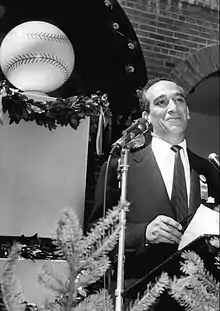
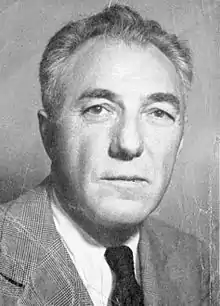

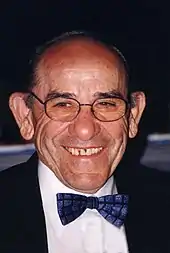
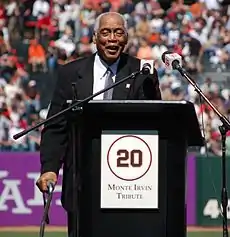
The following is a list of members of the Veterans Committee from its establishment in 1953 to its radical reformation in 2001, along with the dates of their membership.
- J. G. Taylor Spink, publisher of The Sporting News from 1914 to 1962, Chairman of the committee (1953–1959)
- Warren Brown, sportswriter who, among other things, is credited with giving Babe Ruth the nickname "The Sultan of Swat" (1953–1965)
- Charlie Gehringer, Hall of Fame second baseman (1953–1992)
- Warren Giles, President of the National League from 1951 to 1969; general manager of the Cincinnati Reds from 1937 to 1951 (1953–1978)
- Frank Graham, sportswriter of the New York Journal-American. (1953–1965)
- Will Harridge, President of the American League from 1931 to 1959 (1953–1971)
- Paul Kerr, director of the Clark Foundation which funded the Hall, and future President of the Baseball Hall of Fame (1953–1978)
- John Malaney sportswriter for The Boston Post and former BBWAA President (1953–1959)
- Branch Rickey, who helped pioneer the farm system as general manager of the St. Louis Cardinals from 1919 to 1942, signed Jackie Robinson who broke the color barrier as president and general manager of the Brooklyn Dodgers from 1942 to 1950, and was at this time active general manager of the Pittsburgh Pirates, a position he held from 1950 to 1955 (1953–1965)
- Charlie Segar, former sportswriter, and secretary-treasurer of the National League from 1951 to 1971 (1953–1993)
- Frank Shaughnessy, President of the International League from 1936 to 1960 (1953–1969)
- J. Roy Stockton, sportswriter for the St. Louis Post-Dispatch from 1918 to 1958, where he mostly covered the St. Louis Cardinals (1961–1971)
- Dan Daniel, prolific sportswriter whose contributions over a long period led him to be called the dean of American baseball writers (1961–1976)
- Joe Cronin, Hall of Fame shortstop [inducted in 1956] who also served as manager for the Boston Red Sox from 1935 to 1947, general manager for the Red Sox from 1947 to 1959, and President of the American League from 1959 to 1973 (1961–1984)
- Ford Frick, National League President from 1934 to 1951 and Commissioner of Baseball from 1951 to 1965 (1966–1969)
- Fred Lieb, sportswriter best known for nicknaming Yankee Stadium as "The House Ruth Built" (1966–1980)
- Frankie Frisch, Hall of Fame second baseman [inducted 1947], who also served as manager (most notably for the St. Louis Cardinals from 1933 to 1938) and radio play-by-play announcer for Boston and the New York Giants (1967–1973)
- Waite Hoyt, Hall of Fame pitcher [inducted 1969] who also served as radio play-by-play announcer for the Cincinnati Reds from 1942 to 1965 (1971–1976)
- Bill Terry, Hall of Fame first baseman [inducted 1954], manager of the New York Giants from 1932 to 1941 (1971–1976)
- Bob Broeg, sportswriter who covered the St. Louis Cardinals for 40 years, served on the Hall of Fame's Board of Directors from 1972 to 2000 (1972–2000)
- Bill DeWitt, general manager of the St. Louis Browns from 1937 to 1951, and of the Cincinnati Reds from 1960 to 1966 (1973–1981)
- Stan Musial, Hall of Fame outfielder and first baseman [inducted 1969] and general manager of the St. Louis Cardinals in 1967 (1973–2001)
- Burleigh Grimes, Hall of Fame pitcher [inducted 1964] and longtime scout (1977–1985)
- Edgar Munzel, sportswriter who wrote for the Chicago Herald-Examiner and Chicago Sun-Times from 1929 to 1973 (1977–1996)
- Bob Addie, sportswriter who covered baseball for The Washington Post and Washington Times-Herald (1978–1981)
- Joe Reichler, sportswriter for the Associated Press from 1943 to 1966 who mostly covered baseball teams in New York City (1978–1988)
- Roy Campanella, Hall of Fame catcher [inducted 1969] (1978–1993)
- Buzzie Bavasi, general manager for the Brooklyn/Los Angeles Dodgers [1950–1968], the San Diego Padres [1968–1972] and the California Angels [1977–1984] (1978–1999)
- Al López, Hall of Fame manager [inducted 1977] for the Cleveland Indians [1951–1956] and Chicago White Sox [1957–1965, 1968–1969] (1978–1994)
- Gabe Paul, general manager for the Cincinnati Reds [1951–1960], Cleveland Indians [1961–1969, 1971–1971] and New York Yankees [1974–1977], and President of the Cleveland Indians [1963–1971, 1978–1985] and New York Yankees [1973–1977] (1978–1993)
- Joe L. Brown, general manager of the Pittsburgh Pirates from 1955 to 1976 (1979–2001)
- Birdie Tebbetts, manager for the Cincinnati Reds [1954–1958], Milwaukee Braves [1961–1962] and Cleveland Indians [1964–1966] and longtime scout [1968–1997] (1979–1993)
- Allen Lewis, sportswriter for the Philadelphia Inquirer from 1949 to 1979 (1979–2000)
- Buck O'Neil, Negro league first baseman and manager, first African-American coach in Major League Baseball, longtime scout for the Chicago Cubs and Kansas City Royals and member of the Baseball Scouts Hall of Fame in St. Louis (1981–2001)
- Milton Richman, sportswriter for the United Press International from 1944 until his death in 1986 (1983–1986)
- Monte Irvin, Hall of Fame left fielder from the Negro leagues [1938–1942, 1948] and MLB New York Giants [1949–1955] and Chicago Cubs [1956] [inducted 1973]
- Bob Fishel, executive for the St. Louis Browns [1946–1953] and New York Yankees [1954–1974], and American League executive vice president [1974–1988] (1985–1988)
- Ted Williams, Hall of Fame left fielder (1986–2000)
- Shirley Povich, sportswriter for The Washington Post from 1923 until his death in 1998 (1987–1993)
- Red Barber, radio play-by-play announcer for the Cincinnati Reds [1934–1938], Brooklyn Dodgers [1939–1953] and New York Yankees [1954–1966] (1988–1990)
- Ernie Harwell, play-by-play announcer, most notably for the Detroit Tigers [1960–1991, 1993–2002] (1988–1995; 2001)
- Billy Herman, Hall of Fame second baseman [inducted 1975]
- Jack Brickhouse, play-by-play announcer for the Chicago Cubs from 1948 to 1981 (1991–1993)
- Yogi Berra, Hall of Fame catcher [inducted 1972]
- Pee Wee Reese, Hall of Fame shortstop [inducted 1984] and television play-by-play announcer (1994–1999)
- Bill White, sportscaster and National League president from 1989 to 1994 (1994–2001)
- Ken Coleman, play-by-play announcer for the Cleveland Indians [1954–1963], Boston Red Sox [1965–1974, 1979–1989] and Cincinnati Reds [1975–1978] (1996–2003)
- Leonard Koppett, sportswriter and author
- Hank Peters, general manager of the Baltimore Orioles from 1975 to 1987 and GM of the Cleveland Indians from 1987 to 1992 (1996–2001)
- Jerome Holtzman, sportswriter for the Chicago Sun-Times from 1943 to 1981 and the Chicago Tribune from 1981 to 1999, creator of the save statistic, and official historian of Major League Baseball from 1999 until his death in 2008 (1998–2001)
- Hank Aaron, Hall of Fame right fielder [inducted 1982] and senior vice president for the Atlanta Braves since 1980 (2000–2021)
- John McHale, general manager for the Milwaukee/Atlanta Braves [1959–1966] and Montreal Expos [1978–1984], president of the Montreal Expos [1969–1986] (2000–2007)
2008
As of December 2008, for 2009 Baseball Hall of Fame balloting, members of the Veterans Committee were:[23]
- Pre-1943 Veterans Committee members
|
|
|
- Post-1942 Veterans Committee members (67)
2010
As of November 2010, for 2011 Baseball Hall of Fame balloting, the only committee members announced were those voting for the post-1972 Expansion Era candidates:[1]
2011
As of November 2011, for 2012 Baseball Hall of Fame balloting, the 16-member Golden Era Committee was announced:[24]
|
|
|
|
2012
As of November 2012, for 2013 Baseball Hall of Fame balloting, the 16-member Pre-Integration Era Committee was announced:[25]
- Executives: Bill DeWitt, Pat Gillick, Roland Hemond, Gary Hughes
- Former players: Bert Blyleven, Phil Niekro, Don Sutton, Bob Watson
- Historians: Jim Henneman, Steve Hirdt, Tom Simon, Mark Whicker
- Media members: Peter Morris, Phil Pepe, Claire Smith, T. R. Sullivan
2013
The Pre-Integration Committee's 16-member voting electorate, appointed by the Hall of Fame's Board of Directors, was announced at the same time as the ballot of 10 candidates:[26]
- Hall of Famers: Bert Blyleven, Pat Gillick, Phil Niekro, Don Sutton
- Executives: Bill DeWitt, Roland Hemond, Gary Hughes, Bob Watson
- Media and historians: Jim Henneman, Steve Hirdt, Peter Morris, Phil Pepe, Tom Simon, Claire Smith, T.R. Sullivan, Mark Whicker
2014
The Expansion Era Committee's 16-member voting electorate, appointed by the Hall of Fame's Board of Directors, was announced at the same time as the ballot of 12 candidates.[27] The Hall officially calls this group the "Expansion Era Committee", but media still generally refer to it as the "Veterans Committee".
- Hall of Famers: Rod Carew, Carlton Fisk, Whitey Herzog, Tommy Lasorda, Joe Morgan, Paul Molitor, Phil Niekro, Frank Robinson
- Executives: Paul Beeston, Andy MacPhail, Dave Montgomery, Jerry Reinsdorf
- Media and historians: Steve Hirdt, Bruce Jenkins, Jack O'Connor, Jim Reeves
2015
The Golden Era Committee's 16-member voting electorate, appointed by the Hall of Fame's Board of Directors, was announced at the same time as the ballot of 10 candidates.[28] The Baseball Hall of Fame officially named this group the "Golden Era Committee" ("The Committee"), which voted for the first time on December 5, 2011. All of the Hall of Fame members on this committee were inducted as players, except for executive Pat Gillick.
- Hall of Famers: Jim Bunning, Rod Carew, Pat Gillick, Ferguson Jenkins, Al Kaline, Joe Morgan, Ozzie Smith, Don Sutton
- Executives: Jim Frey, David Glass, Roland Hemond, Bob Watson
- Media: Steve Hirdt, Dick Kaegel, Phil Pepe, Tracy Ringolsby
2016
The Pre-Integration ballot for election was released on October 5, 2015; final voting was conducted by the Pre-Integration Committee, a 16-member body which met at baseball's winter meetings in Nashville on December 6, with 75% (12 of 16 votes) required for election; results were announced the following morning. The committee's members, appointed by the Hall of Fame's board of directors, were announced later in fall 2015 and included members of the Hall, baseball executives, members of the media and historians:
- Hall of Famers: Bert Blyleven, Bobby Cox, Pat Gillick and Phil Niekro
- Executives: Chuck Armstrong, Bill DeWitt, Gary Hughes and Tal Smith
- Media/Historians: Steve Hirdt, Peter Morris, Jack O'Connell, Claire Smith, Tim Sullivan, T.R. Sullivan, Gary Thorne and Tim Wendel
Blyleven, Gillick, Niekro, DeWitt, Hughes, Hirdt, Morris, Smith and T.R. Sullivan previously served on the committee which selected the 2013 inductees. For the second consecutive year, none of the candidates received enough votes for election; it marked the third consecutive year – and the fifth time in seven years – in which no former players were chosen by the Hall's special committees.[29] Speaking on MLB Network's Hot Stove immediately after it broadcast the announcement, Major League Baseball's official historian John Thorn expressed surprise and disappointment at the results, noting that he had felt there were three particularly strong candidates (prior to the announcement, he had commented favorably on the candidacies of Doc Adams and Harry Stovey); he speculated that the number of good candidates may have deadlocked the voting once again, and suggested that the Hall may need to amend the voting process in the future.
2017
.jpg.webp)
The committee consisted of the following individuals:[30]
- Hall of Famers: Roberto Alomar, Bobby Cox, Andre Dawson, Dennis Eckersley, Pat Gillick, Ozzie Smith, Don Sutton and Frank Thomas
- Executives: Paul Beeston, Bill DeWitt, David Glass, Andy MacPhail and Kevin Towers
- Media and historians: Bill Center, Steve Hirdt, and Tim Kurkjian
- Non-voting committee chair: Jane Forbes Clark (Hall of Fame chairman)
2018
The committee consisted of the following individuals:[31]
- Hall of Famers: George Brett, Rod Carew, Bobby Cox, Dennis Eckersley, John Schuerholz, Don Sutton, Dave Winfield, Robin Yount
- Executives: Sandy Alderson, Paul Beeston, Bob Castellini, David Glass, Bill DeWitt
- Media and historians: Bob Elliott, Steve Hirdt, Jayson Stark
- Non-voting committee chair: Jane Forbes Clark (Hall of Fame chairman)
2019
The committee consisted of the following individuals:[32]
- Hall of Famers: Roberto Alomar, Bert Blyleven, Pat Gillick, Tony La Russa, Greg Maddux, Joe Morgan, John Schuerholz, Ozzie Smith, Joe Torre
- Executives: Al Avila, Paul Beeston, Andy MacPhail, Jerry Reinsdorf
- Media and historians: Steve Hirdt, Tim Kurkjian, Claire Smith
- Non-voting committee chair: Jane Forbes Clark (Hall of Fame chairman)
2020
The cutoff for election to the Hall of Fame remained the standard 75%; as the Modern Baseball Era Committee consisted of 16 members, 12 votes was the minimum for selection. The 16-member Hall of Fame Board-appointed electorate charged with the review of the Modern Baseball Era featured Hall of Fame members George Brett, Rod Carew, Dennis Eckersley, Eddie Murray, Ozzie Smith and Robin Yount; major league executives Sandy Alderson, Dave Dombrowski, David Glass, Walt Jocketty, Doug Melvin and Terry Ryan; and veteran media members/historians Bill Center,[33] Steve Hirdt, Jack O’Connell[34] and Tracy Ringolsby.[35]
2021
Due to the COVID-19 pandemic, meetings of the Early Baseball committee and Golden Days committee were postponed from December 2020 to December 2021.[36]
References
- "Expansion Era Committee to Consider 12 Candidates for Hall of Fame Election at December's Winter Meetings" (Press release). National Baseball Hall of Fame and Museum. November 8, 2010. Archived from the original on November 11, 2010. Retrieved November 8, 2010 – via Wayback Machine.
- "Pat Gillick elected to Hall of Fame". ESPN.com. Associated Press. December 6, 2010. Retrieved December 6, 2010.
Pat Gillick, whose teams won three World Series titles in 27 years as a major league general manager, was elected to baseball's Hall of Fame on Monday by the Veterans Committee.
- Jaffe, Jay (December 7, 2015). "Pre-Integration Era vote again shows flaws in Hall of Fame's process". Sports Illustrated. Retrieved January 27, 2021.
The Veterans Committee threw another shutout with its Pre-Integration Era ballot results...
- Nightengale, Bob (December 9, 2019). "Opinion: Baseball Hall of Fame assures MLBPA founder Marvin Miller will never be forgotten". USA Today. Retrieved January 27, 2021.
Miller, who was snubbed seven times on the Hall of Fame veterans’ committee ballot...
- Doolittle, Bradford (January 26, 2021). "No one elected to Baseball Hall of Fame; Curt Schilling requests removal from writers' ballot". ESPN.com. Retrieved January 27, 2021.
Players get 10 shots at enshrinement via the writers' voting before moving on to consideration by one of the Hall's various era-based veterans committees.
- Expansion Era Committee "Archived copy". Archived from the original on 2013-04-30. Retrieved 2013-04-13.CS1 maint: archived copy as title (link) Retrieved June 21, 2013
- Golden Era Committee "Archived copy". Archived from the original on April 30, 2013. Retrieved April 13, 2013.CS1 maint: archived copy as title (link) Retrieved June 21, 2013
- Pre-Integration Committee "Archived copy". Archived from the original on 2013-04-30. Retrieved 2013-04-13.CS1 maint: archived copy as title (link) Retrieved June 21, 2013
- "Hall of Fame Makes Series of Announcements" (Press release). National Baseball Hall of Fame and Museum. 2016-07-23. Retrieved 2016-08-14.
- Jaffe, Jay (July 28, 2010). "Prospectus Hit and Run: Don't Call it the Veterans' Committee". Baseball Prospectus. Prospectus Entertainment Ventures, LLC. Retrieved November 3, 2011.
- O'Connell, Jack (2007-07-28). "Veterans Committee Process Revamped". National Baseball Hall of Fame and Museum. Archived from the original on 2007-12-08. Retrieved 2007-08-14.
- "Hall of Fame Board of Directors Restructures Procedures for Consideration of Managers, Umpires, Executives and Long-Retired Players" (Press release). National Baseball Hall of Fame and Museum. July 26, 2010.
- Fagan, Ryan (November 16, 2020). "2020 Baseball Hall of Fame ballot: Will anyone be elected this year?". Sporting News. Retrieved November 16, 2020.
- "Era Rules for Election". Eras Committees. National Baseball Hall of Fame and Museum. Retrieved July 31, 2018.
- Hall of Stat's Players who should be eligible http://www.hallofstats.com/upcoming
- Baseball-Reference Manager's Records https://www.baseball-reference.com/managers/index.shtml
- Best 25 General Managers in Baseball History https://sabr.org/latest/armour-and-levitt-best-25-gms-baseball-history
- All regular-season totals of overall games and games as a home plate umpire are taken from Project Retrosheet's Directory of Umpires. Accessed 2019-11-01.
- https://www.everything2.com/index.pl?node_id=1512121
- Ted Williams, 80, Is Set on Sliding Shoeless Joe From Shame to Fame https://www.wsj.com/articles/SB927759322347277030
- Hal Bock: Banned: Baseball's Blacklist of All-Stars and Also-Rans, Diversion Publishing, New York, NY, 2017. ISBN 978-1635760316
- https://www.usatoday.com/story/sports/nfl/2017/11/21/mlb-permanently-banned-list-pete-rose-shoeless-joe-jackson-john-coppolella/871843001/
- "Gordon Elected to Hall by Veterans Committee". National Baseball Hall of Fame and Museum. 2008-01-12. Archived from the original on December 11, 2008. Retrieved 2008-01-13.
- Barry M. Bloom (December 5, 2011). "Cubs legend Santo elected to Hall of Fame". MLB.com. Archived from the original on December 7, 2011. Retrieved January 7, 2011 – via Wayback Machine.
- "10 finalists named for Baseball Hall of Fame's 2013 Pre-Integration Era ballot". SABR. November 2, 2012. Retrieved October 22, 2019.
- "Rules for Election for Managers, Umpires, Executives and Players for Pre-Integration Era Candidates to the National Baseball Hall of Fame". National Baseball Hall of Fame and Museum. Archived from the original on November 25, 2011. Retrieved January 10, 2012.
- "Twelve Finalists Comprise Expansion Era Ballot For Hall of Fame Consideration in 2014" (Press release). National Baseball Hall of Fame and Museum. November 4, 2013. Retrieved November 6, 2013.
- "Newest Hall of Fame Candidates Announced" (Press release). National Baseball Hall of Fame and Museum. Retrieved November 5, 2014.
- Bloom, Barry M. (December 7, 2015). "Pre-Integration vote yields no Hall inductees". MLB.com. Retrieved December 7, 2015.
- "John Schuerholz, Bud Selig Elected to National Baseball Hall of Fame by Today's Game Committee" (Press release). National Baseball Hall of Fame and Museum. December 4, 2016. Retrieved December 6, 2016.
- "Jack Morris, Alan Trammell Elected to Hall of Fame by Modern Baseball Era Committee" (Press release). National Baseball Hall of Fame and Museum. December 10, 2017. Retrieved December 10, 2017.
- "Lee Smith, Harold Baines Elected to Hall of Fame by Today's Game Era Committee" (Press release). National Baseball Hall of Fame and Museum. December 9, 2018. Retrieved December 9, 2018.
- https://www.sandiegouniontribune.com/sdut-bill-center-staff.html
- Jack O'Connell Bio https://mlblogscutoffman.wordpress.com/about-jack-oconnell/
- https://www.allotsego.com/133305-2/
- Fagan, Ryan (November 16, 2020). "2020 Baseball Hall of Fame ballot: Will anyone be elected this year?". Sporting News. Retrieved November 16, 2020.

